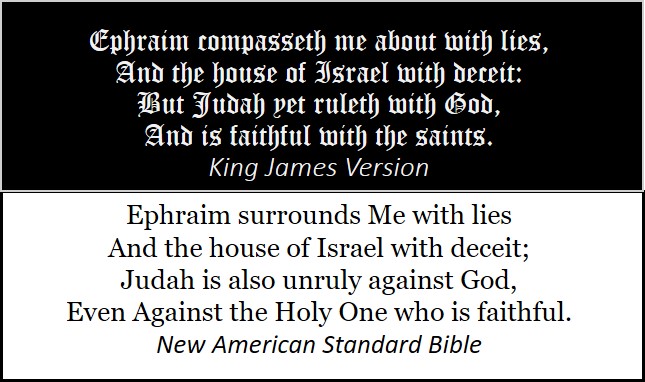EXPLORING THE WORD
Unruly or ruling?
Hosea 11:12
By Fredric A. Carlson

The scholars whose specialty is determining the readings of the original Hebrew texts agree on the spelling and sound of the Hebrew word (rd) that has been preserved in the Hebrew language text of Hosea 11:12.
However, the scholars whose specialty is understanding the meanings of Old Testament words say that through the centuries the precise meaning of the word (rd) has been lost. They say that the only word's general meaning remains, something to do with rule or authority. That explains why rd sometimes has been translated into English as unruly (meaning unruled), and sometimes as ruling with. The uncertainty leaves it to the translators to make judgments based on the context of any passage in which it appears.
The same word is used in several other Old Testament passages. Those passages use rd in some way as having to do with ruling, being ruled, or not being ruled. You will notice that rule is the underlying idea that also is common to both the NASB and KJV translations of Hosea 11:12.
Which translation is "right"? We don't have authority to say absolutely one way or the other. However, if we look at the larger picture, a possibility emerges.
Let's begin with a word about this whole series of prophecies that God sent to His people through his spokesperson, Hosea. God was lamenting the unfaithfulness or spiritual adultery of His beloved people. They no longer loved Him out of reverence or even gratitude, as God so deeply desired (Deuteronomy 6:4–5). They had stopped trusting, obeying, and serving Him. They had forsaken His husbandly love and care in order to pursue other "lovers" — other gods. Seeking love that only God can give, they had prostituted themselves to false gods and the nations that trusted them.
Hosea 11 and 12 summarize this theme. Although God faithfully and dearly loved His people, both the northern ten tribes of Israel (here named "House of Israel" and "Ephraim") and the southern two tribes (here named "Judah") were in various stages of spiritual adultery. Ephraim had hardened its heart in deceitfully stubborn rebellion against God. They had moved beyond hope of repentance. Sometimes Judah still was obediently faithful, and sometimes idolatrous, vacillating between loyalty to God and trusting idols. That is the context, as is also demonstrated in chapter 12, where Judah's punishment is not quite as severe as Ephraim's.
Now let me type in 11:12, using the NASB text. "Ephraim surrounds me with lies, and the house of Israel with deceit; Judah is also unruly against God, even against the Holy One who is faithful." To paraphrase, the nation, while claiming to be God's people, thought that they were getting away with their worship and trust of other gods. The general charge applied to both Ephraim and Judah. The people of Judah were only slightly less evil than Ephraim, for in some ways they sometimes still worshipped God half-heartedly, keeping some of his laws or rules, trying to show how they lived under God's rule, and at other times they wandered away to worship other gods, looking for protection from the nations that worshipped them.
So, Hosea was saying that the always faithful, always reliable God knew that the people of Ephraim were flat out lying when they claimed loyalty to Him, for in every way they had forsaken him. As to Judah, The NASB translators apparently understood the word in harmony with what God judged them to be, unruly (that is, unruled, or unwilling to be ruled, determined to choose for themselves when to submit to God and when to refuse His rule), taking the meaning of vacillating, unbridled, or rambling about like cattle having broken through their fence, wandering without direction, trying to find something to eat. God was not praising Judah for being more faithful to Him than Ephraim, but acknowledging that they had not yet completely abandoned Him.
The KJV translators also may have felt that God was acknowledging that Judah was not yet as apostate as Ephraim was in their total rebellion, that is, that in at least some ways, Judah's leaders still attempted to live under God's rule. Thus those translators intended "ruling with" His rule with Him to mean sharing their hearts with him and other gods. They wanted to obey Him at times, and submit to other lovers at other times, which is one possible meaning of ruled with. Essentially, God was telling them that their hearts were divided between His worship and that of idols. So, in no way did God intend to praise or commend Judah. Instead, this was another warning to return to their first love.
So, we cannot say with absolute certainty which translation is correct, for the clear original dictionary definition of the word has been lost. However, we can say that while the two translations at first seem to contradict each other, they actually can be seen to agree in their essence.
Since most of the more recent reliable translations use unruly or a word meaning about the same thing, that is a safe way to understand the verse. If I had been the translator, using current English (not 1611 English), I likely would use unbridled, unruled, or vacillating between willingness to be under God's rule and unwillingness to be ruled by Him. This seems to me to fit both the context and the most likely ancient meaning of the word.
God was calling both parts of His people — "divorced" Ephraim, and "sometimes separated" Judah — to repent from their unfaithfulness before His final judgment fell. He knew they could find true love nowhere else. He wanted His still-beloved bride to be at home where He could show them what real love was like.
Tags: Biblical-Truth
comments powered by Disqus
Published 4-25-16

